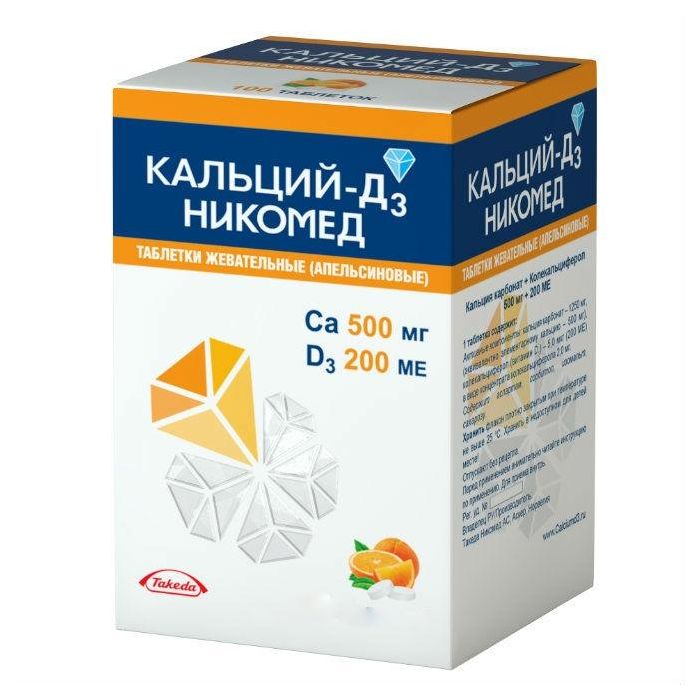calcium carbonate, Kolekaltsyferol | Calcium-D3 Nycomed tablets chewing orange 120 pcs.
Special Price
$24.50
Regular Price
$32.00
In stock
SKU
BID616287
Indications
Prevention and treatment of calcium and / or vitamin D3 deficiency
Prevention and treatment of osteoporosis and its complications (bone fractures).
Contraindications
Hypercalcemia
Hypercalciuria
Nephrolithiasis
Hypervitaminosis D
Renal insufficiency of severe degree
Active form of tuberculosis
Sarcoidosis srdloxid or srd.
The drug in the form of tablets is not used in children under the age of 3 years.
The drug contains aspartame, which in the body is transformed into phenylalanine, so the drug should not be taken with phenylketonuria.
The drug contains sorbitol, isomalt and sucrose, so its use is not recommended for patients with hereditary fructose intolerance, glucose-galactose malabsorption or sucrose-isomaltase deficiency.
Precautions: pregnancy, lactation, renal failure.
Use during pregnancy and lactation
Calcium and vitamin D3 are used during pregnancy to make up for their deficiency in the body.
During pregnancy, the daily dose should not exceed 1500 mg of calcium and 600 IU of vitamin D3.
Hypercalcemia due to overdose during pregnancy can have an adverse effect on the developing fetus.
The drug is used during lactation.
Calcium and vitamin D3 can pass into breast milk, therefore, it is necessary to consider the intake of calcium and vitamin D from other sources in the mother and child.
Special instructions
With prolonged therapy, serum calcium and creatinine should be monitored.
Surveillance is especially important in elderly patients with concurrent treatment with cardiac glycosides and diuretics and in patients with an increased tendency to form kidney stones. In cases of hypercalcemia or signs of impaired renal function, the dose should be reduced or treatment should be discontinued.
Vitamin D should be taken with caution in patients with renal failure. In this case, it is necessary to control the content of calcium and phosphates in the blood serum. It is also necessary to take into account the risk of soft tissue calcification.
In order to avoid overdose, it is necessary to consider the additional intake of vitamin D from other sources.
Calcium and vitamin D3 should be used with caution in immobilized patients with osteoporosis due to the risk of developing hypercalcemia.
Concomitant use with tetracycline or quinolone antibiotics is usually not recommended, or should be done with caution.
Effect on the ability to drive vehicles and control mechanisms
The drug does not affect the ability to drive vehicles or work with technically complex mechanisms.
Dosage and administration of
Tablets can be chewed or dissolved and taken with food. Calcium-D3 Nycomed
Adults for the prevention of osteoporosis - 1 tab. 2 times / day in the treatment of osteoporosis - 1 tab. 2-3 times / day.
To supplement the deficiency of calcium and vitamin D for adults and children over 12 years old - 1 tab. 2 times / day, for children from 5 to 12 years - 1-2 tablets / day, for children from 3 to 5 years - dosage in accordance with the doctor's recommendations.
Side effects of
The frequency of side effects of the drug is estimated as follows:
very frequent (> 1/10)
frequent (> 1/100, <1/10)
infrequent (> 1/1000, <1/100)
rare (> 1/10 000, <1/1000)
are very rare (<1/10 000).
From the side of metabolism and nutrition: infrequent - hypercalcemia, hypercalciuria.
From the digestive system: rarely - constipation, flatulence, nausea, abdominal pain, diarrhea, dyspepsia.
From the skin and subcutaneous tissue: very rarely - itching, rash, urticaria.
Drug Interactions
Hypercalcemia can potentiate the toxic effects of cardiac glycosides when used together with calcium and vitamin D. Monitoring of ECG and serum calcium is necessary.
Calcium preparations may decrease the absorption of tetracyclines from the gastrointestinal tract. Therefore, tetracycline drugs should be taken at least 2 hours before or 4-6 hours after taking the drug.
To prevent a decrease in the absorption of bisphosphonate preparations, it is recommended to take them at least 1 hour before taking Calcium-D3Nycomed.
corticosteroids reduce the absorption of calcium, so treatment with corticosteroids may require an increase in the dose of calcium-D3Nikomed.
With the simultaneous use of thiazide diuretics, the risk of hypercalcemia increases, because they increase tubular reabsorption of calcium. With the simultaneous use of thiazide diuretics, the serum calcium content should be regularly monitored.
Calcium reduces the effectiveness of levothyroxine, reducing its absorption. The period of time between doses of levothyroxine and Calcium-D3Nycomed should be at least 4 hours.
Absorption of quinolone antibiotics decreases with simultaneous use with calcium preparations. Therefore, quinolone group antibiotics should be taken 2 hours before or 6 hours after taking Calcium-D3Nycomed.
Taking foods containing oxalates (sorrel, rhubarb, spinach) and phytin (cereals) reduces the absorption of calcium, so you should not take Calcium-D3 Nikomed within 2 hours after eating sorrel, rhubarb, spinach, cereals.
Overdose
Symptoms:
Manifestations of hypercalcemia - anorexia, thirst, polyuria, muscle weakness, nausea, vomiting, constipation, abdominal pain, increased fatigue, bone pain, mental disorders, nephrocalcinosis, urolithiasis and, in severe cases, cardiac arrhythmias.
With prolonged use of excessive doses (over 2500 mg of calcium) - damage to the kidneys, calcification of soft tissues.
If symptoms of an overdose are found, the patient should stop taking calcium and vitamin D, as well as thiazide diuretics and cardiac glycosides, and consult a doctor.
Treatment:
Gastric lavage, replenishment of fluid loss, use of loop diuretics (e.g. furosemide), corticosteroids, calcitonin, bisphosphonates. It is necessary to control the content of electrolytes in blood plasma, renal function and diuresis.
In severe cases, central venous pressure measurement and ECG monitoring are necessary.
Storage conditions
The product should be stored in a tightly closed vial, in a dry, out of the reach of children at a temperature not exceeding 25 РC.
Expiration
3 years. Do not use after the expiry date.
active substance
Calcium carbonate Kolekaltsiferol
Terms leave through pharmacies
Without prescription
Dosage form
tablets for resorption
Indications srdlp From osteoporosis, With malnutrition, During active growth, With menopause
Possible product names
Calcium-D3 Nycomed chewable tablets orange 120 pcs.
Takeda Pharmaceuticals Ltd., Russia
Write Your Own Review

